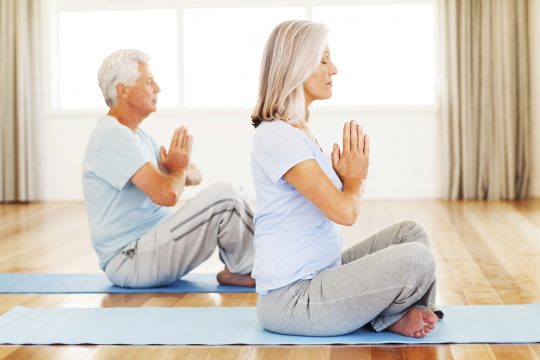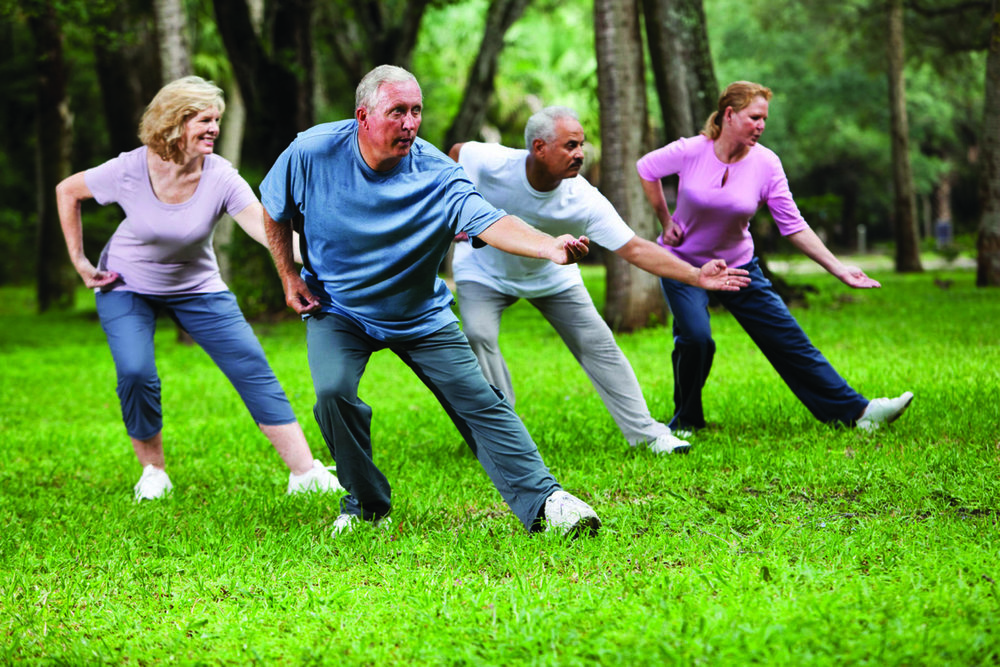
The term “New Age” originated in the 1970s, referring to the western world’s adoption of Eastern spiritual, mental and physical practices. Many residents of our All Seniors Care retirement homes were young adults in the 70s, and remember when yoga was a strange new workout that seemed incredibly exotic!
Cut to fifty years later and you can’t walk half a block without seeing a yoga studio. Mindfulness apps like Headspace and 10% Happier have brought meditation into the mainstream and if you walk through a park on a beautiful day you are quite likely to see a group of folks running through a series of tai chi exercises.
While some seniors have been training the mind and aligning body and spirit since the 70s, many others are just discovering these practices now. At All Seniors Care, where we place a high value on health, happiness and overall wellbeing, we recognize the many benefits of these ancient eastern traditions and provide as many resources as possible for our residents to practice them regularly.
In this post, we’re going to look specifically at the benefits of guided mindfulness meditation and tai chi for seniors. Whether you’re interested in an All Seniors Care seniors home in Alberta, Manitoba, Ontario, Saskatchewan or Quebec, you can be sure that there’s plenty of green space for tai chi and a serene indoor atmosphere for peaceful meditation.
Meditation: Positive Traits & Blissful States
The Basic Idea – While many western meditation practices are decoupled from spiritual beliefs, the act of designating an object of meditation (typically the breath) and returning to it whenever the mind wanders trains and strengthens your brain in the same way that going to the gym strengthens your body. Whether this is done for an hour a day or just five minutes, meditation will still have many benefits if performed consistently.
Blissful States – Over a lifetime of work, marriage, parenting and adventure, the mind picks up a lot of habits. Slowing down and listening to the breath, we realize our minds are going a mile a minute. Practicing meditation slows and quiets your thoughts and helps you enjoy the present moment in your day-to-day life. Even without the additional benefits, this sense of peace is worth the effort!
Positive Traits – Oftentimes, mindfulness meditation is supplemented with compassion or “Metta” meditation that develops a sense of loving-kindness for yourself and others. All Seniors Care’s core culture is based in compassion, connection and kindness, and we love this idea! Training the mind helps to develop patience and sharper focus when listening to others, and Metta meditation helps you see things from many different perspectives. You don’t have to be Buddhist to see why this is so advantageous.
Top Three Health Benefits of Meditation for Seniors
- Slowing and Softening the Onset of Alzheimer’s & Dementia – In the same way that a strong body is less likely to be injured, a strong mind is less likely to succumb to memory problems. Still, it is estimated that over 50% of folks older than 85 have some form of dementia, and meditation alone will not eradicate this problem. Studies suggest that meditation and breathing exercises can reduce the anxiety and depression that often accompanies the onset of dementia, making the situation more manageable.
- Digestion – Believe it or not, meditation actually helps with digestion! The deep breathing involved helps with circulation and heightens the amount of oxygen in the blood, leading to better digestion. This means you’ll be able to enjoy the healthy, delicious meals carefully crafted by our Red Seal chefs in comfort!
- Stress Reduction – Meditating is shown to shrink the amygdala region of the brain, which is responsible for stress, anxiety and negative thinking. At the same time, it strengthens the prefrontal cortex, which is good for personal development, creativity and planning.
Tai Chi: A Low Impact Workout to Improve Balance & Energy

The Basic Idea – Many people think of tai chi as movement meditation, and so if you are a bit restless by nature, it may be a better bet than sitting meditation. There is, however, also walking meditation for those who enjoy strolling at a relaxed pace. Tai chi involves stabilizing the breath and making slow, circular movements throughout the workout to improve the energy flow in your body.
The Yin Yang Factor – There is some imagination involved in tai chi, as many cycles involve creating an energy ball between your hands and attuning yourself to the external world. This may sound pretty far out for some, but it is all based in the well-known ancient Chinese philosophy of yin and yang. Yin and yang refer to opposing forces that are reliant on each other, like summer and winter or light and dark – tai chi is meant to bring you into harmony with these seemingly antagonistic forces. Whether or not you accept the philosophy, you can use your imagination to explore these mysteries as you exercise.
Exercising Outdoors – At All Seniors Care, we are meticulous about finding land with access to green space and walking paths for our seniors’ residences across Canada. As a result, our residents are able to get plenty of fresh air and exercise outdoors in temperate weather. A mid-morning tai chi session on a sunny spring day is relaxing and invigorating all at once if you want to combine movement with your mindfulness practice!
Top Three Health Benefits of Tai Chi for Seniors
- Strength/ Balance – While tai chi is not an intense workout, it develops balance and strength through slow, deliberate movements. These exercises can strengthen your stabilizer muscles and give you an opportunity to improve your balance to guard against falling and injury.
- Cognitive Function – Because the movements in tai chi are subtle, slow and correlated to the breath, they require consistent attention or soft focus as it is sometimes called. The development of sustained focus will improve your overall cognitive functions.
- Arthritis Prevention/ Management – In addition to increasing range of motion and flexibility, tai chi can help to reduce and manage arthritis. You’re only meant to push yourself to 70% of what you could do – that is, stopping the motion 30% short of feeling pain. Thus, unlike other forms of exercise, there is less of a likelihood of injuring yourself. Just listen to your body!
If you have any additional questions about our exercise facilities and classes, give us a call at your convenience and we’ll be happy to chat. We also encourage you to check out our Instagram page for awesome pics and more health tips for seniors!